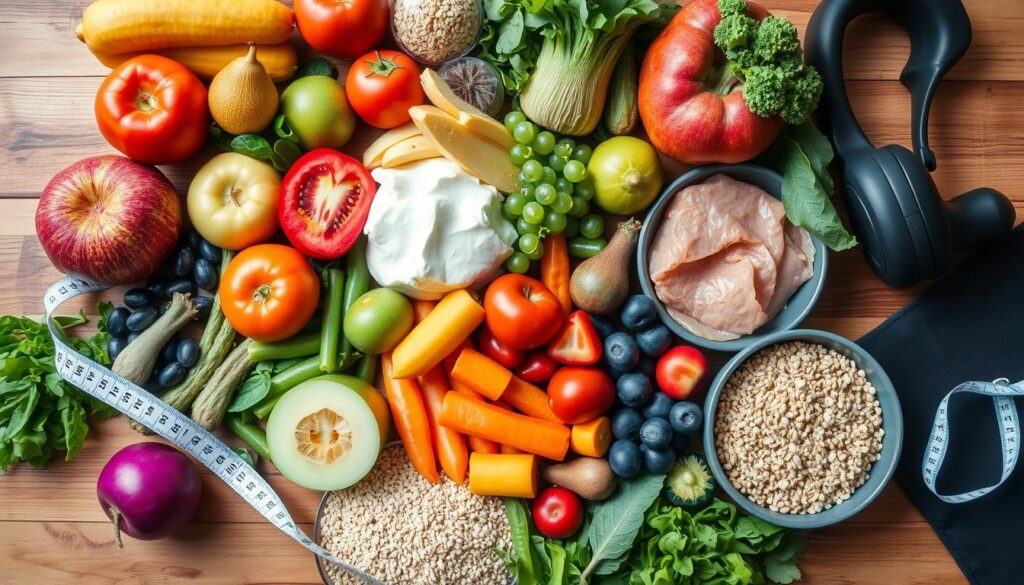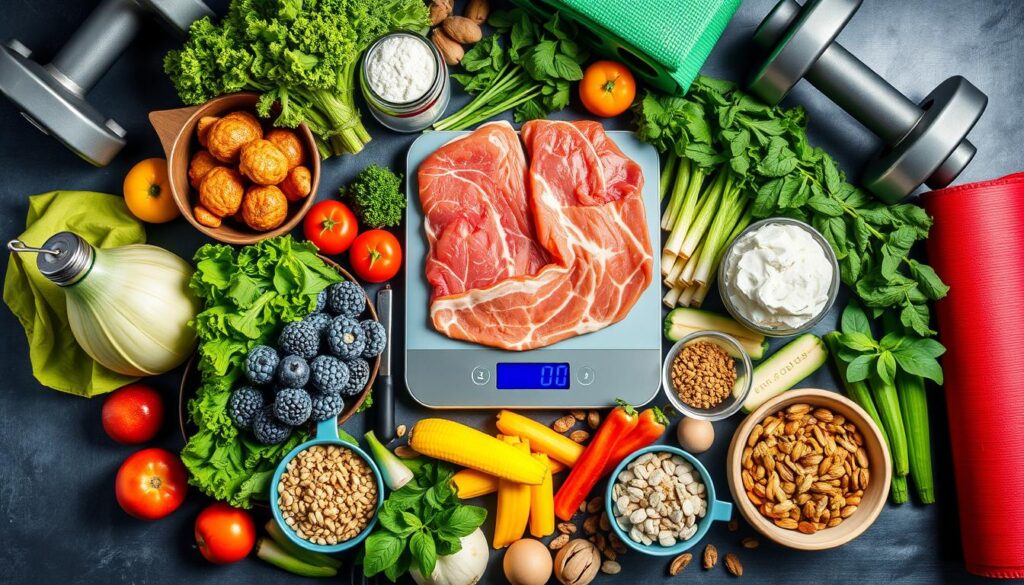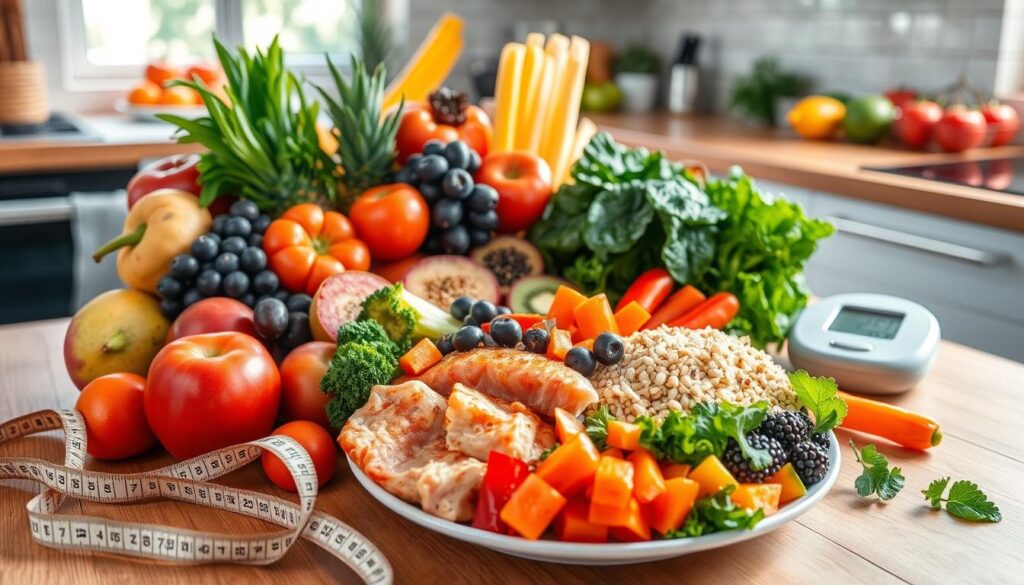Did you know that 80% of people who set specific fitness goals succeed? This shows how vital a personalized diet plan is for reaching health goals. It’s all about matching your diet to your needs, lifestyle, and goals.
Choosing the right diet plan can be tough with so many options. But, a personalized diet ensures you meet your health goals. We’ll show you how to make a diet plan that fits you perfectly. This includes setting clear goals, checking your current diet, and planning your workouts.
Understanding the role of nutrition in your health is key. With a diet plan made just for you, you’ll see better results in your fitness journey. Whether you want to lose weight or boost your health, a tailored diet plan is the way to go.
Understanding Personalized Diets
Personalized nutrition is a way to tailor diet and nutrition to fit an individual’s needs. It takes into account each person’s unique body type and macros needs. This approach helps people reach their fitness goals more effectively.
A study by ZOE found big health benefits in personalized nutrition. Over 80% of participants felt more energetic and weren’t hungry after three months. This shows how personalized nutrition can improve health and fitness.
Some key benefits of personalized nutrition include:
- Improved overall health and well-being
- Increased energy levels
- Enhanced athletic performance
- More effective weight management

Personalized nutrition considers each person’s body type diet and macros needs. It helps individuals make better diet choices. This approach can also help achieve fitness goals, like better health, more energy, or improved athletic performance.
| Benefit | Description |
|---|---|
| Improved overall health | Personalized nutrition can help individuals achieve optimal health and well-being |
| Increased energy levels | Personalized nutrition can help individuals increase their energy levels and reduce fatigue |
| Enhanced athletic performance | Personalized nutrition can help athletes optimize their performance and achieve their goals |
Assessing Your Fitness Goals
Creating a personalized diet plan starts with knowing your fitness goals. You might want to lose weight, gain muscle, or boost your health. Having clear goals helps you see how far you’ve come and keeps you motivated.
For losing weight, tracking calories is key. If you’re trying to gain muscle, focus on protein and what you like to eat. Think about your dietary preferences and include them in your plan. For example, vegetarians need to find protein in plants.

Setting realistic goals is crucial for success. This means aiming to lose a certain amount of weight or build muscle. A muscle gain diet needs more calories, while losing weight means eating fewer. Knowing your needs helps you make a plan that fits your life and goals.
Importance of Goal Setting
Setting goals is vital for success in fitness. Clear objectives guide you and let you track your progress. This keeps you motivated and focused, even when things get tough. Whether you’re on a diet to lose weight or gain muscle, tracking calories and your food choices is important.
Evaluating Your Current Diet
To make a diet plan that’s just right for you, start by looking at what you eat now. Think about your food allergies, how much you eat, and how your body uses energy. Knowing these things helps you make a diet plan that fits your needs.
Keeping a food journal is a good way to check your diet. Write down what you eat, how much, and when. Looking at your journal can show you patterns. You might see you eat too much at some times or have a hard time resisting certain foods.
It’s also key to look at your eating habits. Think about if you mostly eat processed foods or if you get enough veggies. Knowing your habits helps you spot where you can do better. Important things to look at include:
- Food allergies and intolerances
- Portion control and serving sizes
- Energy needs and metabolism
- Overall nutrient intake, including vitamins and minerals

By carefully checking your diet and finding areas to improve, you can create a diet plan that’s perfect for you. This plan will help you reach your health and fitness goals.
| Factor | Importance | Actions to Take |
|---|---|---|
| Food allergies | High | Avoid trigger foods, consult a doctor or dietitian |
| Portion control | Medium | Use measuring cups, eat slowly and mindfully |
| Energy needs | High | Consult a doctor or dietitian, consider a calorie-tracking app |
| Metabolism | Medium | Stay hydrated, exercise regularly, get enough sleep |
Discovering Your Macros
Understanding macronutrients is key to a personalized diet plan, crucial for workout nutrition. Carbohydrates, protein, and fat are vital for pre-workout, post-workout, and recovery meals. The Dietary Guidelines suggest adults get 10-35% of calories from protein, 20-35% from fat, and 45-65% from carbs.
To figure out your macros, first find out your daily calorie needs. Then, split those calories into the recommended percentages for each macronutrient. For instance, with 2000 calories a day, aim for 200-700 calories from protein, 400-700 from fat, and 900-1300 from carbs. This balance is vital for reaching your fitness goals, like losing weight, gaining muscle, or boosting athletic performance.
A well-thought-out macro plan can help you meet your fitness goals. It can also manage blood sugar and improve health. Tracking macros offers several benefits, including:
- Improved nutrient balance
- Increased satiety
- Enhanced athletic performance
- Better weight management

By eating whole foods and balancing your macros, you support your fitness and health goals. Always talk to a healthcare provider or registered dietitian to find the right macro plan for you.
| Macronutrient | Recommended Daily Intake |
|---|---|
| Protein | 10-35% of total calories |
| Carbohydrates | 45-65% of total calories |
| Fat | 20-35% of total calories |
Tailoring Your Meal Plan
Creating a personalized diet plan is key to reaching your fitness goals. It’s important to think about when and how often you eat, what meals to include, and adding variety. A good meal plan helps with weight control and supports building lean muscle. Supplements can also boost your meal plan’s effectiveness.
Understanding how different foods affect you is crucial. Balanced meals with protein, healthy fats, and carbs help keep blood sugar stable and support health. Eating a variety of foods ensures you get all the nutrients you need.
Here are some tips for customizing your meal plan:
- Plan your meals ahead to have healthy choices ready
- Include a range of foods to get all nutrients
- Think about your dietary likes and limits when planning
By using these tips and considering your unique needs, you can make a meal plan that helps you reach your fitness and health goals. Be open to changing your plan as needed to keep it working for you.

| Meal Planning Tips | Benefits |
|---|---|
| Plan meals in advance | Reduces food waste and saves time |
| Incorporate variety | Ensures all necessary nutrients are included |
| Consider dietary preferences | Supports individual needs and restrictions |
Incorporating Exercise
Adding exercise to your diet plan is key to reaching your fitness goals. A fat loss diet paired with regular workouts can boost weight loss and heart health. Choose exercises you like and that fit your life, like walking, running, or swimming.
Types of Exercises to Pair with Diet
There are many exercises that go well with a high-protein meal to help muscles grow and recover. These include:
- Cardio exercises, such as jogging or cycling, to improve cardiovascular health
- Strength training exercises, such as weightlifting or bodyweight exercises, to build muscle
- Flexibility exercises, such as yoga or stretching, to improve flexibility and balance
How Exercise Affects Nutrition
Exercise changes how we eat in several ways. For instance, it can make us hungrier and speed up our metabolism, helping us follow a balanced nutrition plan. It also reduces stress and boosts mood, aiding in a healthy lifestyle. Here’s a quick look at how exercise impacts nutrition:
| Exercise Type | Benefit on Nutrition |
|---|---|
| Cardio | Improves cardiovascular health, increases metabolism |
| Strength Training | Builds muscle, improves recovery |
| Flexibility | Improves flexibility, balance, and reduces stress |

Adapting to Lifestyle Changes
Adapting to lifestyle changes is key to a personalized diet plan. It means understanding budget and time management to make smart diet choices. Adding active living to your day can be easy, like a short walk at lunch or jumping jacks during TV commercials.
Food logging is also crucial. Tracking what you eat helps spot patterns and adjust your diet. You can use a notebook or a mobile app for this. Also, nutrient timing and diet customization help tailor your nutrition to your needs and goals.
Here are some tips for adapting to lifestyle changes:
- Start small: Make gradual changes to your diet and exercise to avoid feeling overwhelmed.
- Find a workout buddy: Having someone to keep you accountable and share ideas with can be very motivating.
- Track your progress: Use a food log or mobile app to monitor your eating and activity.

By following these tips, you can set yourself up for success and make lasting changes. Be patient and kind to yourself, and don’t hesitate to ask for help when needed.
| Tips for Adapting to Lifestyle Changes | Benefits |
|---|---|
| Start small | Reduces feelings of overwhelm, increases chances of success |
| Find a workout buddy | Increases motivation, accountability, and social support |
| Track your progress | Helps identify patterns, makes adjustments easier, increases motivation |
Monitoring Progress
Regular check-ins are key to track your progress and tweak your diet plan. A good plan should include vegetarian diet or vegan diet options. It should focus on whole foods and encourage healthy eating habits. By keeping an eye on what you eat and how much you exercise, you can spot areas to get better. This helps you make smart choices to reach your fitness goals.
Using nutrition apps can help you track your progress. These apps let you track calories, macronutrients, and plan meals. Some top picks include Calorie Trackers, Food Tracking, and Recipe Builders. They also offer hydration tracking, grocery lists, and tips to save money.
When tracking your progress, keep these points in mind:
- Regularly track your food and exercise
- Watch your weight, measurements, and body fat
- Check your energy, soreness, and motivation
- Change your plan if needed to meet your goals
By focusing on these areas, you can stay on track to reaching your fitness goals. Always be mindful of your nutrition and adjust your plan when necessary. With the right tools and attitude, you can live a balanced and healthy life.

| Factor | Importance |
|---|---|
| Regular check-ins | High |
| Tracking food intake | High |
| Monitoring exercise | Medium |
| Assessing energy levels | Medium |
Staying Motivated and Engaged
Keeping motivated and engaged is key to your diet plan’s success. Finding support and celebrating small wins helps you stay on track. This way, you can reach your fitness goals.
Finding Support and Community
Having a supportive network is crucial for your weight loss journey. Look for online communities, join local fitness groups, or get help from friends and family. They can offer encouragement and keep you accountable.
Sharing your progress and challenges with like-minded people can boost your motivation. It keeps you inspired and moving forward.
Celebrating Small Wins
Always celebrate your successes, no matter how small. Recognizing your progress, like fitting into a favorite pair of jeans, boosts your motivation. It shows you the positive changes you’re making.
Using nutrient-dense foods, cooking tips, and meal prep strategies also adds to your sense of accomplishment. It keeps you engaged in your fitness journey.





















